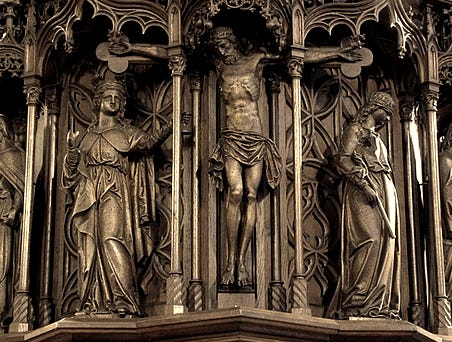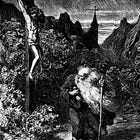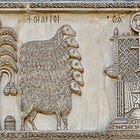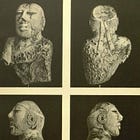Hi everybody, I am now in transitional housing with rather rudimentary wifi. I do not have most of my books with me (they are being transferred to storage while I look for a proper, permanent and accessible place), so with both poverty of internet and poverty of books I can’t do a huge amount of work (I have some reading material, but not everything I need). In the meantime I will be trying to read deeply rather than broadly (which is not natural to my ADHD), and working on a longer research project on Isaiah - and putting out what I have already written of this project. In the meantime I have read Mikhael Manekin’s End of Days, which I highly recommend and am finishing up Boyarin’s Travelling Homeland (which I also recommend as I do all of his work that I have read).
Things are fairly rough right now but are, G-d willing, getting better, and I am deeply grateful to all who have supported me during this time, and to the frankly overwhelming number of people who have responded positively to this work, and the couple of new friends I have made through it. So many thanks, and many blessings to all.
Earlier parts here:

Reading this material, one may ask where, in all of this, is Walter Benjamin? In the other major volume of this period, The Sacrament of Language, Benjamin warrants only a single, passing mention, and in Opus Dei he does not appear at all.1 None of the previously outlined paradigm of Messianism can be found in Benjamin. To my knowledge Paul is not mentioned anywhere in Benjamin’s oeuvre at all (if he were important to Benjamin’s thought, one would expect him to appear at least somewhere in the Arcades), and I only know of one attempt he made to understand Luther, while recovering from malaria in Ibiza, which appears to have had limited, if any, success.2 It is, I think, telling, that Agamben’s connection of these terms to Benjamin requires the lengths made in The Time that Remains, as well as the conflation of his remarks in the “Critique of Violence” with other works, assuming equivalence of terms and precluding the idea that Benjamin’s thought developed between that essay and his later work.3
Where Benjamin appears in The Kingdom and the Glory, however, is particularly telling. The primary thesis of the book – the importance of Christian theology for understanding the development of modern politics – is, once again, drawn from Carl Schmitt, whose theory that political concepts are secularized religious concepts can be extended “well beyond the boundaries of public law, extending up to the fundamental concepts of the economy and the very idea of the reproductive life of human societies.”4
The problem with the thesis advanced here is twofold: “theology” is not univocal even within Christianity, much less between Christianity and its sister faiths; and the divine oikonomia – as Agamben defines it, the immanent activity of G-d – depends entirely on the nature of G-d that one assumes. For but one example, the internal economy of the Divine is a logical impossibility in a strictly monotheist framework predicated on absolute divine simplicity, such as that of Rambam, al-Farabi or ibn Sina.5 Likewise, theology, in decidedly anti-secular forms, has central to political project of the world-wide ascendent right for decades – though also often in markedly different and contradictory forms.
For Agamben, however, “theology” is largely uniform and abstract, with determinative power over the social. This uniform abstraction can be seen in where Benjamin is invoked, in the context of an analysis of the debate on the possibility of Political theology between Erich Peterson and Carl Schmitt. Here, Benjamin (by way presumably of the two words identified in The Time that Remains), is placed at “the singular intersection of Christianity and Judaism” – a description by far more appropriate for Agamben’s other interlocutor on Paul, Jacob Taubes.6
Here Benjamin is presented as contributing to a broad conversation regarding political theology, including the idea, from Peterson, that the failure of the Jews to convert is the katechon, the mechanism by which eschatology is held at bay (2 Thes 2:3-8, a passage not cited by Peterson). Agamben defines this connection between the unbelief of the Jews and the delay of the Parousia as that which “defines the specificity of the particular Catholic anti-Semitism of which Peterson is a representative,” however he fails to notice the that this text (1929) predates Peterson’s conversion to Catholicism (December 1930), which makes the particularly Catholic nature of this prejudice difficult to accept.7 Likewise elided is the express intention of Petersen’s framing, which is that through the Jews failure to convert they gave Christians the gift of the Church, a position intended to disarm that of Schmitt and demonstrate that prejudice against Jews is misaimed and theologically futile, and the eschaton is external to human concern.8 The extreme conclusion that Agamben brings – that Petersen’s rhetorically clumsy theological attempt to disarm Christian antisemitism is somehow implicated in the destruction of the Jews that would follow – is only possible if one ignores the extensive contribution to that event by German Protestantism, and if one severs him from the mechanism by which he attempts to repudiate Christian antisemitism: his theological rejection of any human ability to hasten the end of days, thereby excluding the issue of eschatological-soteriological concerns from the political sphere.9
Against Peterson’s position, Agamben cites Paul’s statement that “all Israel will be saved” (Rom 11:26, also cited by Peterson), but elides the process by which Paul describes this salvation occurring which is the basis on which Peterson builds his position.10 Agamben implies that this theology is the result of a misreading of Paul, however Paul is quite explicit, and his soteriological vision is not lacking in animus – according to Paul Jewish unbelief is the result of Israel’s hearts being hardened, like that of Pharaoh, making them unable to understand the truth, but their eyes will be opened when “the fullness of the Gentiles have come in” and “in this way all Israel will be saved” (my emphasis). But until then the Jews are “enemies, for your sake” (speaking to his Gentile audience, Rom 9:13-18; 11:7-10, 25-32). While Peterson does misread this, reversing causality – the conversion of the Jews has no causative power here, but rather it is the conversion of the nations which will, in turn, cue G-d to reverse his divine prevention of Jewish understanding of the truth of Paul’s message – the connection of the status of the Jews to Christian eschatology is not unique to Peterson, nor to Catholics, nor, even, to modern Christians (though it does undergird modern Christian Zionism). This problem exists within the writings of Paul himself, Agamben’s “fundamental messianic text for the Western tradition,” to which he thinks Benjamin also adheres. Given that a disinterested survey of Benjamin’s correspondence shows a marked ambivalence to Christianity and an outright hostility to those who attempt to marry it to Judaism, described as “those hideous pacesetters of Protestant theologoumena within Judaism,” it is clear Agamben’s Pauline Benjamin is a fiction, and Agamben’s messianism is primarily drawn from Paul, under the influence of Heidegger.11 It is from Heidegger’s Paul that that Agamben is able to describe “divine praxis” as “anarchic and unfounded” and posit this realization – something new in Christianity – as the key to “deactivating” the “governmental machine.”12
Here we find a strange projection: a condemnation of the idea of converting the Jews by way of conflating it with their extermination by one who has tacitly converted Benjamin post mortem, and whose culturally Christian political theology – an impossibility to Petersen, though in perfect congruence with the “legitimate Catholic antisemite” Schmitt – necessitates a framework in which, despite his atheism, supersessionism is presupposed, both culturally and aspirationally in the nullification of Torah as an allegory for civil law and governance.13
To illustrate this, in The Highest Poverty Agamben writes that “our problem [becomes] intelligible only if one does not forget that [it is] superimposed over the theological problem of the relation between the two diathēkai, the Mosaic law and the New Testament.”14 here, our problem is that of the “more or less juridical nature of the monastic rules.”15 This problem arises, however, in the context of a greater project, to “bring to light” that which:
is unthought and perhaps today unthinkable, which the syntagmas vita vel regula, regula et vita, forma vivendi, forma vitae sought laboriously to name, and in which both rule and life lose their familiar meaning in order to point in the direction of a third thing.16
This thing gestured toward (and, to be sure, not fully realized in monasticism) is “form of life;” a life that is inappropriable, and “linked so closely to its form that it proves to be inseparable” – this form-of-life, for Agamben, answers the question of Auschwitz. Putting aside the very real problem that Auschwitz seems to point to the alienability of any form of life – the way in which the victims of the Nazis lived, be they assimilated, secular Jews, Chasidim or Litvaks, Roma, queer or disabled people or political dissidents doesn’t appear to make much difference to their ability to be stripped of everything, including life itself – this is the ethos, the life as embodiment of ethics that Agamben wishes to uncover. However, to solve Agamben’s problem, “our problem,” it must be “restored to its proper theological context” in order to be properly understood – the vehicle for this understanding is “the irreducibility of the Christian form of life to the law.”17 Thus, that which the Christian life points toward is universalised as the implicit, potential life concealed within the tradition of the Occident, and therefore the “Christian forma vivendi itself—which is what the rule has in view—cannot be exhausted in the observance of a precept, which is to say that it cannot have a legal nature.”18 The book continues to elaborate on the instantiation of this extra-legal form-of-life in the radical spiritual Franciscan movement, a “life outside the law” of radical renunciation which therefore “must be made a form of life,” justified explicitly in eschatological terms in “which the very life of Christ is made newly present in the world to bring to completion, not the historical meaning of the ‘person’ in the economy of salvation, so much as his life as such.”19 In this, any adherence to or significance attributed to the Torah and its mitzvot is drawn into parallel with political oppression, contrasted against human liberation. There is no consideration of the possibility that rabbinic custom could be fruitfully compared to monastic ideals (and, in fact, has), as the framing of this discussion, and all else in the Homo Sacer series precludes such an idea. This is, at least in part likely because it does not – outside of certain mystical frameworks – bear a direct relation to eschatology, nor to an overturning of an old order.20
Here, however, we should be careful. While Agamben affirms the cultural supersession of Judaism by Christianity both historically and intellectually in the development of Occidental thought, for him Christianity is not the answer, but part of the problem. There is a strange tension here between a narrative of Christian cultural triumphalism and the equation of this triumphalism with political disaster, however this is resolved by the fact that, for Agamben, religion no longer has any real stakes except insofar as they are bear upon the intellectual history of the Occident: for Agamben, the “Death of G-d” is a historico-mythical fact, and one which applies seemingly universally. Religion is no longer tenable after the enlightenment:
Men have peacefully survived the death of God and continue to live peacefully […] Nihilism, which European intellectuals greeted at first as the most disturbing of guests, has become a lukewarm and indifferent everyday condition.21
Christianity, too, has been superseded. Thus, mirroring Heidegger’s pronouncement in the infamous der Spiegel interview (though eschewing the interview’s primary political content), Agamben affirms “Heidegger’s diagnosis” as “irrefutable and true” because “Humanity has renounced the decisive status of spiritual problems and created a special sphere in which to enclose them: culture” in which what survives of the prior age is confined to museums and the like as mere curiosities.22
next post:
The Sacrament of Language, in Agamben, Omnibus., 339.
“I have now grasped for the fifth or sixth time in my life what is meant by justification through faith. But I have the same trouble here as I have with infinitesimal calculus: as soon as I have mastered it for a few hours, it vanishes again for just as many years.” Benjamin to Scholem, c. September 10-12 1933, Walter Benjamin and Gershom Scholem, The correspondence of Walter Benjamin and Gershom Scholem, 1932-1940, 1st American ed. (New York: Schocken Books, 1989). 76-7.
There is a connection between the “Critique” and his later work, and this thread does run through his work on Kafka, however this path is significantly more complex than Agamben allows. This will be elaborated in part below (בע״ה, if it gets finished, this is a work in progress)
Kingdom and the Glory, in Agamben, Omnibus. 374-86.
The “economy” of the sefirot in the theosophical Kabbalah is, technically, external to the simple unity of Ein Sof, however this may be splitting hairs. Agamben naturally disagrees but this is directly contra-indicated by Ein Sof being a product of strict apophatic theology of divine simplicity, see Use of Bodies in Omnibus, 1173-6. Both Agamben’s problem and its solution are resolutely etic to Kabbalistic theology.
Agamben, Omnibus. 376. See also Jerry Z. Muller, Professor of apocalypse : the many lives of Jacob Taubes (Princeton: Princeton University Press, 2022). 3, describing Taubes as inhabiting “the border between Judaism and Christianity” and passim.
Agamben, Omnibus. 379; Cf. Michael J Hollerich, in the introduction to Erik Peterson, Theological tractates, ed. Michael J. Hollerich, Cultural memory in the present, (Stanford, California: Stanford University Press, 2011). xv. While Peterson was “en route to Rome” with this essay (Ibid, xx), his first Catholic publication would not be for another 4 years (xxii). While Hollerich is perhaps too kind regarding Peterson’s attitude toward the Jews, he does make the observation that Agamben fails to provide – that Peterson’s attitudes on this issue did, in fact, change. To my knowledge the same cannot be said for Schmitt, which makes both Agamben’s extreme condemnation of Peterson while siding, at least in principle, with Schmitt on the question of political theology all the more alarming. Accentuating this is that Agamben makes the same mistake in his reading of Peterson that Schmitt does, by Hollwerich’s reading. Peterson’s position in Monotheism is not apolitical, but rather “Peterson was asserting the superiority of the religious to the political: the supranational kingship of Christ admitted no merely national rival,” and, in contrast, the Church is only provisionally a political entity, and this is the key element that separates a Christian from a Pagan understanding of politics (xxiv-v). It should also be noted that this is not a particularly different position in social implication from Augustine’s Doctrine of Witness, which is markedly more tolerant than the vast majority of Patristic and Medieval theologians.
Erik Peterson, "The Church," in Theological tractates, Cultural memory in the present (Stanford, California: Stanford University Press, 2011). 31.
Ibid. 39.
Ibid. 32.
Benjamin to Scholem, Feb 28 1933, Benjamin and Scholem, The correspondence of Walter Benjamin and Gershom Scholem, 1932-1940. 28.
Kingdom and the Glory, in Agamben, Omnibus. 430-1, 370-1. That Heideggerian influence comes by way of his seminars on Paul, see above.
This is Taubes’ description of Schmitt from “Appendix A: The Jacob Taubes Carl Schmitt Story” in Taubes, The political theology of Paul. 104.
Highest Poverty, in Agamben, Omnibus. 925.
Ibid. 912.
Ibid. 887.
Ibid. 925.
Ibid. 926.
Ibid. 999-1000. This “life outside the law” is aspirational, given the conflict the spiritual Franciscans came into with the See over their exact place within Canon Law, in which they cast their own position as within the bounds of said system.
The relationship between Torah and Monsastic literature has been studied by Michal Bar-Asher Siegal, Early Christian monastic literature and the Babylonian Talmud (Cambridge, New York: Cambridge University Press, 2013). Passim. I think it is not surprising that Agamben appears unaware that the tradition of the Kabbalah is by necessity hypernomian, and thus his continual gestures toward a Sabbatianism characterised by antinomianism, which is itself ahistorical as even a brief survey of Scholem’s work on either that movement or the Kabbalah in general would demonstrate. I expect it is because of his presupposition of this antinomian core to messianism that Agamben ignores this key element of the Kabbalah, even though Scholem is quite clear about it. Relatedly, as previously noted, when Kabbalah and eschatology mix the result is, at least in part, embodied in Religious Zionism. It is also worth noting that Gershom Scholem, in the final interview of his life, compared Gush Emunim to the Sabbatian movement, see Scholem, Gershom. "The Threat of Messianism." Interviewed by David Biale. New York Review of Books, no. 13. 1980. 22. https://www.academia.edu/44509028/David_Biale_The_Threat_of_Messianism_An_Interview_with_Gershom_Scholem_The_New_York_Review_of_Books_vol_27_no_13_14_August_1980_22.
Giorgio Agamben, "God, man, animal," [Dio, uomo, animale.] Autonomies (2024), https://autonomies.org/2024/05/giorgio-agamben-god-man-animal/ Original: https://www.quodlibet.it/giorgio-agamben-dio-uomo-animale.
Giorgio Agamben, "Only a god can save us now," [Solo un Dio ci può salvare.] Autonomies (2024), https://autonomies.org/2025/03/giorgio-agamben-only-a-god-can-save-us-now/ Original: https://www.quodlibet.it/giorgio-agamben-solo-un-dio-ci-pu-lvare.









